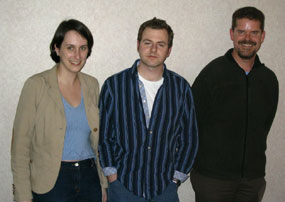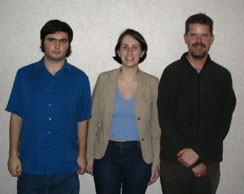Yes, I’ve been gone for a million years. No, I don’t have a good excuse. For those who had behind-the-scenes information, Steven’s wisdom teeth came out successfully with only minor weird snags. I’ve got ideas for several posts I’d like to make, but first I have to play along because Lyle Masaki hit me with the little book meme, although I’m considering doing the big book meme too, although with a certain amount of commentary to make it a little more worthwhile and to disobey the rules.
Anyway, here’s the best I can do bookwise:
You’re stuck inside Fahrenheit 451, which book do you want to be?
Ian Brill said that he wouldn’t want to have to recite all of Infinite Jest, which has convinced me I would. It would be so much fun to figure out how to deal with all the footnotes and footnotes to footnotes that I’d never have to recite it the same way twice.
When I was a tiny kid and had a better memory than I do now, I could recite full pages of several of the Narnia books, but I don’t think that’s what I’d want to keep with me for all time. I’m not sure David Foster Wallace is either, but I’m hoping that if I ever get stuck inside Fahrenheit 451 it’s a pretty safe bet that this post won’t be considered legally binding.
Have you ever had a crush on a fictional character?
I know I’ve written here before that I’m really bad at having celebrity crushes. It just doesn’t seem plausible that anyone I don’t know would want a relationship with me, nor would I with someone I don’t know well. So while this all seems like nonsense to me, I’m going to give this my best shot and Steven will probably tease me later for being inadequate and lying. Anyway, I’m not really sure. As a child, I was very taken with Ernestine Gilbreth of Cheaper by the Dozen and Belles on their Toes, although since they’re basically autobiographical that probably only counts on a technicality. I certainly idealized and adored and yearned for all three main characters in Emma Donoghue’s Stir-Fry, which might be as close to a crush as I can get. I was often convinced as a child that if I could only meet the characters I was reading about, they would be better friends than any live children could be, and I suppose it’s this sense of cosmic rightness on an adult scale that’s what constitutes crushes of this sort. Boy, I’m not answering the question. Maybe I should move on and come back if I actually think of anything.
The last book you bought is:
Not counting comics/trade paperbacks, it was probably when a trip to a used bookstore in Knoxville netted me a whole load of feminist theory stuff, especially several books on eating disorders for well under $1 each. Oh, and a very cool-looking book, The Medieval Greek Romance, which I haven’t begun yet.
I tend not to buy myself new books much because they’re so expensive and I’m so stingy. My rule used to be that I only bought very cheap books or books I knew I’d lend out, but I’ve loosened that rule a bit.
The last book you read:
Again, excepting all the comics I’ve been reading, I think the last book I finished would be The World According to Mimi Smartypants, which is a collection of posts from the blog of Mimi Smartypants. I’d already read all the posts in their original, more fun and hyperlinky context, but while I won’t go so far as to call this a character crush, I do sort of think of Mimi Smartypants as an alternate universe version of me, if I’d managed to do cool things and have better friends and druggier experiences and a different homelife, but with the same violin background and dorky Greek obsession. I can’t believe I’m admitting this on the blog, which is yet another proof that even if I’m right I am indeed the doofus version.
I read Neal Stephenson’s The Baroque Cycle and Susanna Clarke’s Jonathan Strange & Mr Norrell in fairly quick succession a few months ago and haven’t read much fiction since then, although I’m about to swing back in that direction.
What are you currently reading?
Oy. This is embarrassing, because as I said I’m very much between novels and so have a bunch of different things going and going slowly. Bedtime reading has been Kim Chernin’s The Hungry Self: Women, Eating, and Identity, which is not too exciting but still a seminal eating disorder book. Various articles from Feminism Beside Itself and The New Feminist Criticism show up as bathtime reading when I’m not featuring manga or a frivolous magazine. And then I really need to get back to Victorian Sappho, a book by Yopie Prins on reinterpretations of Sappho’s poetry and biography/identity by Victorian poets, because I haven’t even gotten to the argument about how my beloved Swinburne’s uses of her meters have more to do with the way they sound like flogging than the extent to which they are direct homage. And of my birthday books, I must admit I’m only reading Epileptic and slowly for some reason, I think to savor it. Usually I’m an unstoppable reader who devours things, but I’m taking my time here and haven’t even gotten out of the material covered in the first volume I’d already read.
Five books you would take to a deserted island.
(Was anyone else annoyed by the way this quiz started with full sentences and fell away from it quickly?)
Gravity’s Rainbow, by Thomas Pynchon. Adam Stephanides is rereading it and now a blogless friend is reading it for the first time and I’m tempted to go back into it. It’s a book that could sustain many rereadings and hold me for a long time.
I Capture the Castle, by Dodie Smith. Maybe Cassandra should count as a crush, because her voice is one of the most amazing and consistent of any I’ve ever read. This book makes me laugh every time I read it.
I’d need some giant poetry collection, Norton or something. I used to have an amazing two-volume set of 20th century poetry, Poems for the Millennium, but I’d need it to cover more time than that.
And since I think I’d want something to keep me cheerful, I’m going to go for a massive P.G. Wodehouse collection of Jeeves & Wooster stories over Robert Benchley’s My Ten Years in a Quandary and How They Grew, but it’s a tough decision and one I’d probably regret a bit eventually.
Fifth is going to be my cheaty one. I want The Odyssey in Greek, but of course my Greek isn’t good enough to just read it, so I need a dictionary and maybe a grammar and some pens and notebooks, which would help pass the rest of the time anyway. I figure this is no worse than people bringing the complete works of Dickens or something like that. And I won’t even try to sneak in The Iliad on analogous grounds, because they clearly have different authors and I clearly prefer one to the other. Although both Andromache and Hector give some potentially crush-worthy speeches….

